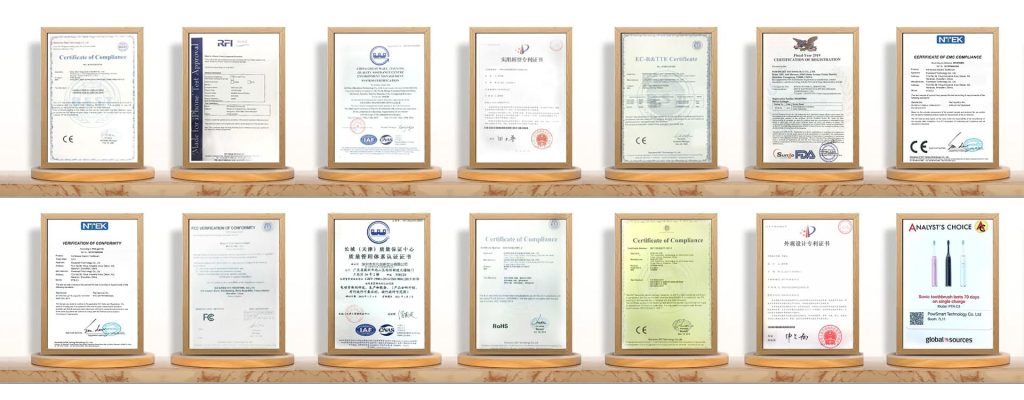When buying wholesale teeth whitening kits, many brands often face many choices and challenges. To ensure success, it is crucial to understand and avoid common mistakes. This article will help you choose the right wholesale teeth whitening kit and teeth whitening supplier more wisely.
Ignoring the supplier’s qualifications
Choosing a qualified supplier of teeth whitening products is the key to success. Many brands only focus on price when choosing, but ignore the supplier’s qualifications and market reputation. According to industry surveys, 80% of companies said that compliance issues directly affect the market performance of products. Therefore, it is necessary to ensure that suppliers have relevant certifications.
As an OEM and ODM manufacturer that has served brands for more than 20 years, Powsmart has passed ISO9001, ISO 13485 and FDA registrations, and has obtained CE, FCC, ROHS, SGS, Reach and other certifications. It can provide high-quality, safe and effective products and perfect OEM services for brands.

Insufficient understanding of product ingredients
When buying whitening teeth products, it is crucial to understand the ingredients of the product. Many brands fail to check ingredients in detail, which may lead to product quality issues or violations of market safety regulations. Data shows that products using low-quality ingredients may lead to negative feedback from consumers, which will affect the brand image. It is wise to ensure that products that meet market safety regulations and are clinically tested and have safe ingredients are selected.
Underestimating market demand
Before buying wholesale teeth whitening kits in bulk, it is essential to understand market demand. Many brands blindly purchase goods without conducting market research, resulting in unsalable products. According to data from market research institutions, correctly predicting market demand can increase sales by at least 20%. Therefore, brands should use market data and analytical tools to make wise decisions. According to research reports, the teeth whitening market is expected to reach US$7.44 billion by 2024, with a compound annual growth rate of 3.75%, and will reach US$8.94 billion by 2029. Therefore, for brands that are still considering entering this industry, this is undoubtedly a market with huge potential.
Ignoring after-sales service
When choosing teeth whitening kits, many brands ignore the importance of after-sales service. A good supplier should be able to provide continuous technical support and product assurance. Companies that provide high-quality after-sales service have a 30% increase in customer satisfaction. Choosing a teeth whitening supplier that provides comprehensive after-sales service will help establish a long-term cooperative relationship.
Ignoring the consideration of the cost dimension
Price competitiveness: Under the premise of ensuring quality, price is a factor that cannot be ignored when companies choose suppliers. Multiple comparisons should be made to ensure that the prices of the selected suppliers are market competitive.
Cost saving potential: In addition to direct price, the supplier’s cost control capabilities in material procurement, production efficiency, inventory management, etc., as well as whether it is willing to share cost savings opportunities with the company should also be considered.
Long-term cooperation value: Establishing a long-term and stable cooperative relationship with suppliers can help reduce transaction costs and improve the overall efficiency of the supply chain. Therefore, when evaluating costs, the long-term value of cooperating with suppliers should also be considered.
Ignoring multi-dimensional comprehensive evaluation and selection
In actual operations, companies should incorporate multiple dimensions such as quality, cost, and service into the supplier evaluation system based on their own needs and market environment, and use a combination of quantitative and qualitative methods for comprehensive evaluation. At the same time, long-term factors such as suppliers’ innovation capabilities, environmental awareness, and social responsibility must also be considered to ensure that the selected suppliers can grow together with the company and achieve a win-win situation.





